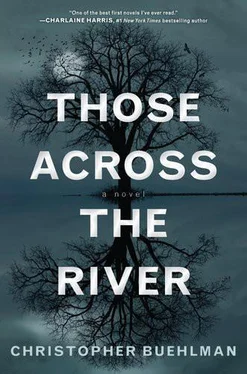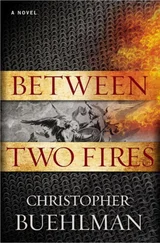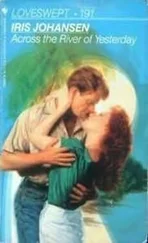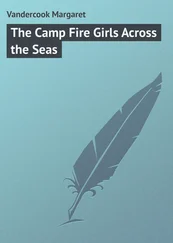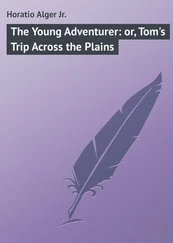“Anyway, we rolled out of the pub and went looking down dark alleys and under bridges and ended up passing out in Hyde Park. No Shuck. I always remembered that name. It sounds like a death-dog, doesn’t it? It sounds like little Gordeau has a piece of that same story. Funny how legends travel.”
“Nothing about this business sounds funny to me. The moon should be full tonight. Like it was that night you came home from the woods and had your dreams. What did you see out there, Frankie?”
“Nothing.”
“Liar.”
“Just the bogeyman.”
“Now you’re a smart aleck. You always get wise when something’s bothering you. Can we just stay in tonight?”
“Sure. A night in with my best girl.”
“Wife.”
“Not soon enough,” I said, brushing her bangs from her forehead.
I noticed that Harvey had left off wiping again because he was staring out the window into the town square where the merciless midday light illuminated a lone, squatting figure.
“Well, that man is a plum idiot if ever I saw one. What in hell does he think he’s doing?”

“WHAT ARE YOU doing, Martin?” the big man said.
I had walked out so I could eavesdrop. I might have felt ashamed if I had been the only one.
The taxidermist looked up at Sheriff Blake, who had come out of the hardware store still buckling on the belt of his office, and who was now standing over him with the sun behind him. The big man looked more fatigued than angry, and he asked Martin again, “Now, just what are you doing?”
Martin placed upon his own head the garland of tea roses he had just crafted. He went from a squat to a sitting position, sitting Indian-style with a cigarette in his mouth.
“What I am doing,” Martin said, “is fashioning myself a moon crown, since I am high on moonshine. I am tired of looking at these goddamned flowers and they are tired of being looked at, so I am putting them out of everyone’s misery. If you like my headdress, I would be happy to make you one of your own. I am sure there are enough flowers even for your head, which is not small.”
Estel hunkered down, removing his shadow from Martin Cranmer, and he said, “Now, how are we going to fix this?”
Martin said nothing.
“I’ll tell you how. I’m going to trust you to take yourself home and tuck yourself in like a good boy to sleep off your drunk.”
“That’s not what’s going to happen,” Martin said slowly and jovially.
“And when you wake up, you’re going to come back here and plant new flowers at your own expense.”
Martin shook his head, grinning broadly so his yellowish teeth stood out against his beard. He stood up on legs that looked ready to buckle. The sheriff stood up, too.
“I have destroyed public property,” Martin said.
“Yes,” Estel said, “yes, you have. And if you don’t make it right, maybe I’ll come around to your house and destroy me some private property. Like some illegal property that turns mash into shine.”
Martin, still smiling, noted that people, myself included, were standing under the awnings of the shops around the square now, and I believe it was mostly for our benefit that he undid his trousers and urinated on the remains of the rosebushes.
The sheriff waited for him to finish and button up. When he had, Estel said, “Now would you please wipe your damn hands on your shirt?”
Martin obliged, swaying gently.
“Thank you,” the sheriff said, taking Martin’s wrists and cuffing them behind his back.
“I really did not want to drive to Morgan today, you damn fool, I really did not. But you are under arrest for public drunkenness and indecency and maybe vandalism, too. We’ll sort that out when you dry out. You get a couple days in the hole. Probably a fine I know you cain’t pay. This is really a sorry business.”
“You have no idea,” Martin said, looking oddly sober for just that moment. “May I keep my garland?”
“Oh sure. You gonna pay for it, might as well enjoy it. Let’s take a ride.”
Some of those watching broke into applause when the sheriff led Cranmer away, but I did not join them. That’s when Martin noticed me in the crowd.
He winked.
I’m nearly sure he winked.
WHEN NIGHT CAME down on Whitbrow it came down hard. It came down like an army that had been waiting for the chance to sack and plunder the roost of its ancient foe. Sherman had found Atlanta. Troy had fallen. Rome was upon Carthage and the moon was its general. Forgive me for invoking these images retroactively, knowing as I do what would happen that night on the eastern edge of town; but I have the impression that even then I knew.
Something.
The moon came up, and since it was filtered by dust it took a color between red and pink, like the tissue of a lung or some other tender organ stretched postmortem before a candle. In time it dried and yellowed and then went titanium white, hanging higher and higher, seeming to see everything beneath it.
I watched it rise from the front yard of the Canary House. I watched it for better than an hour, smoking cigarettes one after the other, which I had not realized I was doing until I left and saw all the dead butts at my feet.
When I went to bed I could not sleep with all the light in the room, no matter how many times I shifted my position. I wondered in how many beds one spouse tossed or feigned sleep while another slept hard, as Dora was sleeping, beautifully illuminated by but unmindful of the greedy moon outside our window.
I wondered if the good pastor was trying to quicken a child in the belly of his mousy little wife, and I chuckled at that. Then I remembered Paul Miller’s widow, and wondered how she was making out sleeping on the edge of the valley her husband’s mass had undoubtedly pressed into their mattress. That was a mean thought, and not funny after all. I let it turn to sand and blow out of my head. But my mind would not be quieted.
When I finally did start to sleep, I was startled out of it when I realized that Dora had jerked in the bed. She had been lying on her stomach, but now arched up, listening.
How like a Sphinx.
“What was that?” she said.
“I didn’t hear anything.”
“Far away,” she said, and slept again quickly.
I knew she wouldn’t remember.
I knew, also, that war dreams were coming.
I woke up choking, and the woman who would soon be my wife woke up, too, and stroked my head until I knew there was no gas in the room.

I HEARD THE news the next day at the general store.
Friday the thirteenth.
A hard-luck day, all right.
Buster Simms walked in purposefully and took his hat from his head.
“Y’all heard yet?”
“Heard what?” Charley Wade, the carpenter, said.
“Falmouth boy’s killed. Somethin killed him.”
“What d’ya mean, ‘somethin’?”
“I don’t know. That’s what Old Man Gordeau said. He’ll be here presently. Sheriff went out to look at what’s left. Found him in the ruts of that old blowed-over locust tree not far from the Falmouths’.”
I remembered that kid. Tyson. He had played baseball with me that first weekend on the lot near the town square; brown-haired and freckled. Polite. Jerky but a fast runner.
Ten years old.
His head was a little too big for his body.
The details came in all day, from different mouths.
Knowing what I know now, it’s easy enough to put together.
Something was after his father’s pigs.
He wanted to be a big boy, so he took his father’s rifle and put on his father’s slippers and went out to see what it was.
Читать дальше
